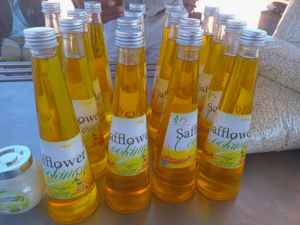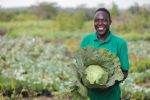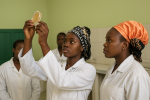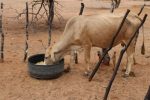Enhancing safflower production and product development for food security and improving incomes of small-scale farmers in Botswana
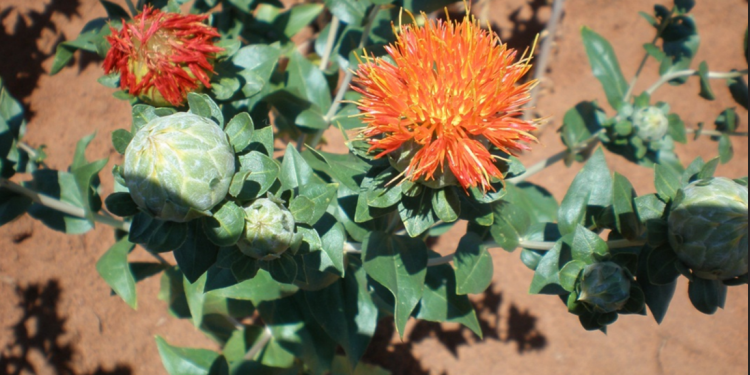
Safflower (Carthamus tinctorius L.), an often-overlooked oilseed crop, is proving to be a game-changer for smallholder farmers in Botswana. Safflower is increasingly gaining popularity for its resilience, nutritional value, and industrial potential as a sustainable agricultural option for farmers, businesses, and governments facing climate adaption challenges.
Grown primarily for its seeds that yield high-quality edible oil, Safflower can also be used in the production of animal feed, herbal teas, natural dyes, cosmetics and pharmaceutical products. With its remarkable tolerance to drought, heat, cold and salinity, Safflower is uniquely suited for Botswana’s arid and semi-arid landscape. Its ability to thrive in low-input environments makes it an ideal crop for small-scale farmers facing increasingly unpredictable weather patterns and limited access to farming resources.
To capitalize on this potential, The Regional University Forum for Capacity Building in Agriculture (RUFORUM) under the TAGDev program in partnership with the Botswana University of Agriculture and Natural Resources (BUAN) , launched the Community Action Research Project (CARP) focused on Safflower. Led by Professor, Vallantino Emongor, Principal Investigator, Crop and Soil Sciences Department, at BUAN, the project aimed to build a comprehensive value chain for Safflower by enhancing production, develop marketable products, and train the local farming community – particularly women who were affected by gender-based violence during the COVID-19 lockdown.
Through this initiative, over 160 women have been trained and organized into cooperatives such as the Saff Energy Initiative Multipurpose Co-operative Society. These groups now actively produce safflower-based goods, including cooking oil, herbal teas, natural dyes, cosmetics and livestock feed. The project didn’t just provide agricultural training, it also created an economic value chain.
In addition to empowering communities, the Safflower CARP project carried out extensive field research across multiple regions in Botswana. The team evaluated different safflower genotypes for their seed yield, oil quality, and petal content. Fertilizer trials helped determine the most efficient nutrient applications for various soils. The research also explored pest dynamics, optimal harvest times and chilling injury effects amongst others.
One of the project’s key successes was the integration of universities, Technical Vocational Institutions (TVETs), government agencies, and private sector into the safflower ecosystem. Students were trained in practical research and outreach, farmers received hands-on instruction, and cooperatives gained the skills to process and market safflower products. This collaborative approach extended from seed multiplication to final product packaging and branding.
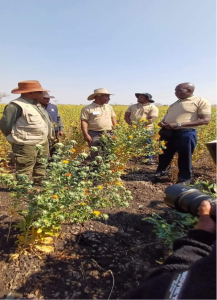 The President of the Republic of Botswana visited a 100 Ha safflower farm in Pandamatenga on 1st August 2024
The President of the Republic of Botswana visited a 100 Ha safflower farm in Pandamatenga on 1st August 2024
The economic promise of safflower is significant. Its oil, rich in mono and polyunsaturated fatty acids, is a healthier alternative to commonly imported oils and holds a strong competitive advantage over olive oil. The petals and leaves, meanwhile, are packed with compounds that offer therapeutic benefits, from regulating blood sugar and improving circulation to supporting fertility and treating various ailments. As such, safflower tea and extracts are finding a niche in the wellness and functional food sectors.
The inclusion of Safflower in the government’s revised Temo-Letlotlo agricultural support program further validates its strategic importance. Now recognized as one of 13 priority crops, Safflower cultivation has expanded to an estimated 250 hectares. For every four hectares supported under the program, one must be allocated to Safflower, signaling a strong political will for its growth.
With rising demand for Safflower seeds and products, seed multiplication efforts are underway with the assistance of BUAN and the Department of Agricultural Research to supply local farmers. Private sector involvement, including seed companies and farmer associations, is also being encouraged to meet this growing demand and drive commercial expansion.
The project’s achievements go beyond technical outputs. By promoting safflower as a climate-smart, multipurpose crop, the initiative is helping transform Botswana’s agricultural landscape. It is promoting food and nutrition security, boosting rural incomes, creating employment, and reducing the country’s reliance on imports.
Safflower offers a unique opportunity to diversify Botswana’s economy and enhance resilience in rural communities. Its versatility across various industries, combined with its ability to thrive in challenging environments, positions it as a strategic crop in the fight against food insecurity and poverty. However, to fully unlock its potential, continued investment in research, processing technologies, supportive policies, and market development is essential.
Botswana is making significant progress towards a more inclusive, climate-resilient agricultural future by establishing a strong safflower value chain that connects academics, farmers, policymakers, and enterprises.
Full project report available upon request at l.mwanyangapo@ruforum.org
